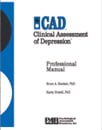
Clinical Assessment of Depression cad
For: Comprehensive assessment of depressive symptomatology in ages 8-79 years
Reading Level: Child - Elder Adult
Format: Paper-and-Pencil
Length: 10 Minutes
Scoring: Hand Scored; or Online (via PARiConnect)
Online Forms, Reports, Kits & e-Manuals
All online resources including Forms, Reports, i-Admins, Kits and e-Manuals.
Printed Kits
Click to browse products
Printed Forms & Handscoring Materials
Test forms, response booklets and scoring reference manuals.
CAD online Score Report (each) min order 5
CAD online i-Admin (each) min order 5
CAD Introductory Kit
CAD Rating Forms (25)
CAD Score Summary/Profile Forms (25)
Contact PAA today to set up your PARiConnect online account to utilise online administration, scoring and reporting.
Authors
Bruce A. Bracken, PhD, Karen Howell, PhD
Description
The CAD is a 50-item self-report instrument that is comprehensive, highly reliable, and sensitive to depressive symptomatology throughout the lifespan. It is closely aligned with the hallmarks of depression in children, adolescents, and adults -depressed mood and anhedonia -as well as the additional seven criteria for major depressive episodes listed in the DSM-IV-TR™. Standardised on a large representative national sample, the CAD is composed of items that are general enough to be relevant to children, adolescents, and adults, while simultaneously providing content that is focused enough to address the unique characteristics of children and adolescents (e.g. irritability), as well as adults (e.g. depletion syndrome characteristics).
The CAD has strong psychometric and clinical properties. Interpretation of the CAD takes into consideration the client’s depressive symptomatology at different levels after assessing the validity of the responses. Three Validity scales are embedded within the instrument -Inconsistency, Negative Impression, and Infrequency. These Validity scales make the assessment of response validity more user-friendly and easier than other well-known depression assessment scales. CAD interpretation begins with the CAD Total Scale, the most reliable scale component. Next, interpretation of the highly reliable Symptom scales -Depressed Mood, Anxiety/Worry, Diminished Interest, and Cognitive and Physical Fatigue – is performed. Lastly, interpretation of the Critical Item clusters is examined. The Critical Item clusters are composed of Hopelessness, Self-Devaluation, Sleep/Fatigue, Failure, Worry, and Nervous. The clinician is provided with a full range of quantitative and qualitative output including raw scores, T scores, percentiles, confidence intervals, qualitative classifications for the Symptom scales, and descriptive classifications for the Validity scales.
Special Features of the CAD
Consists of a single form that is appropriate for individuals ages 8-79 years.
Represents a well-defined and theoretically supported measure of depressive symptomatology.
Provides response validity scales that are not included with other well-known competitive instruments, (e.g. Beck Depression Inventory-II, Hamilton Depression Inventory).
Presents theoretically and empirically sound broad-content scales and specific diagnostic indicators.
Critical Item clusters identify behaviours with known risk factors for potential self-harm.
Provides very strong psychometric qualities using a large, diverse, national normative sample.
Requires only a third-grade reading level for completion.
Optional software scoring system, the CAD-SP, is available.
Available for online scoring via the PARiConnect Platform
The CAD materials consist of the Professional Manual, the 50-item carbonless Rating Forms and the Score Summary/Profile Forms. The Rating Form may be hand-scored or responses may be hand-entered into the CAD Scoring Program (CAD-SP). For information on the CAD-SP.
The CAD standardisation sample is composed of 1,900 children, adolescents, and adults ages 8-79 years and is generally well matched to the U.S. population for gender, race/ethnicity, and educational level by age group as defined by the U.S. Bureau of the Census (2001). Total scale reliabilities range from .96-.97 across the entire age range suggesting strong internal consistency for the CAD Total Scale score regardless of age group assessed. Concurrent validity for the CAD was measured via comparison with the Beck Depression Inventory-II (BDI-II; Beck, Steer, & Brown, 1996) and the Reynolds Adolescent Depression Scale (RADS; Reynolds, 1987), revealing correlations for the combined clinical and non-clinical samples that are in the moderate-to-high range.
NB: Prices are in Australian dollars inclusive of GST. NZ customers need to log in to view ex-GST prices.
 NZ
NZ





